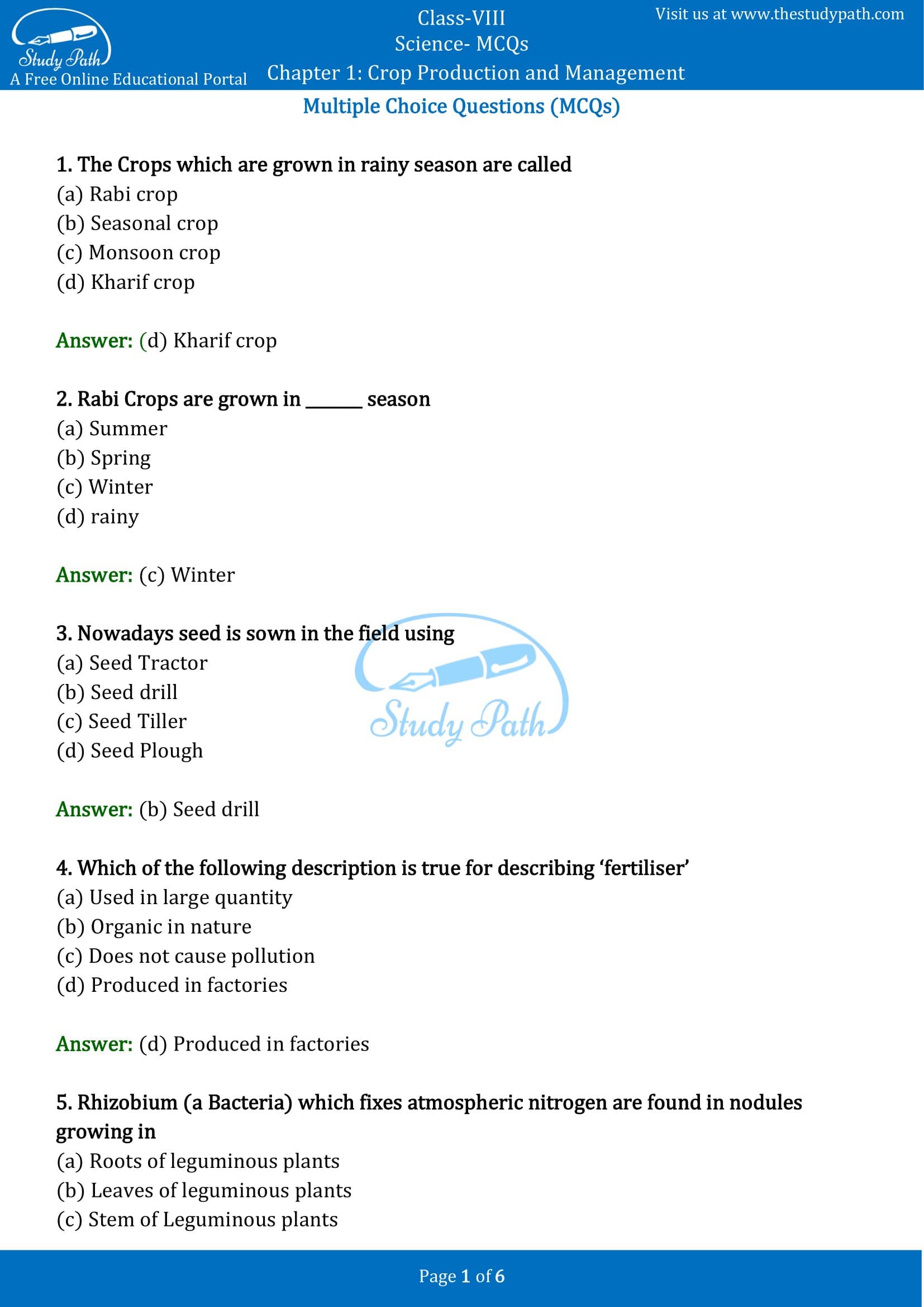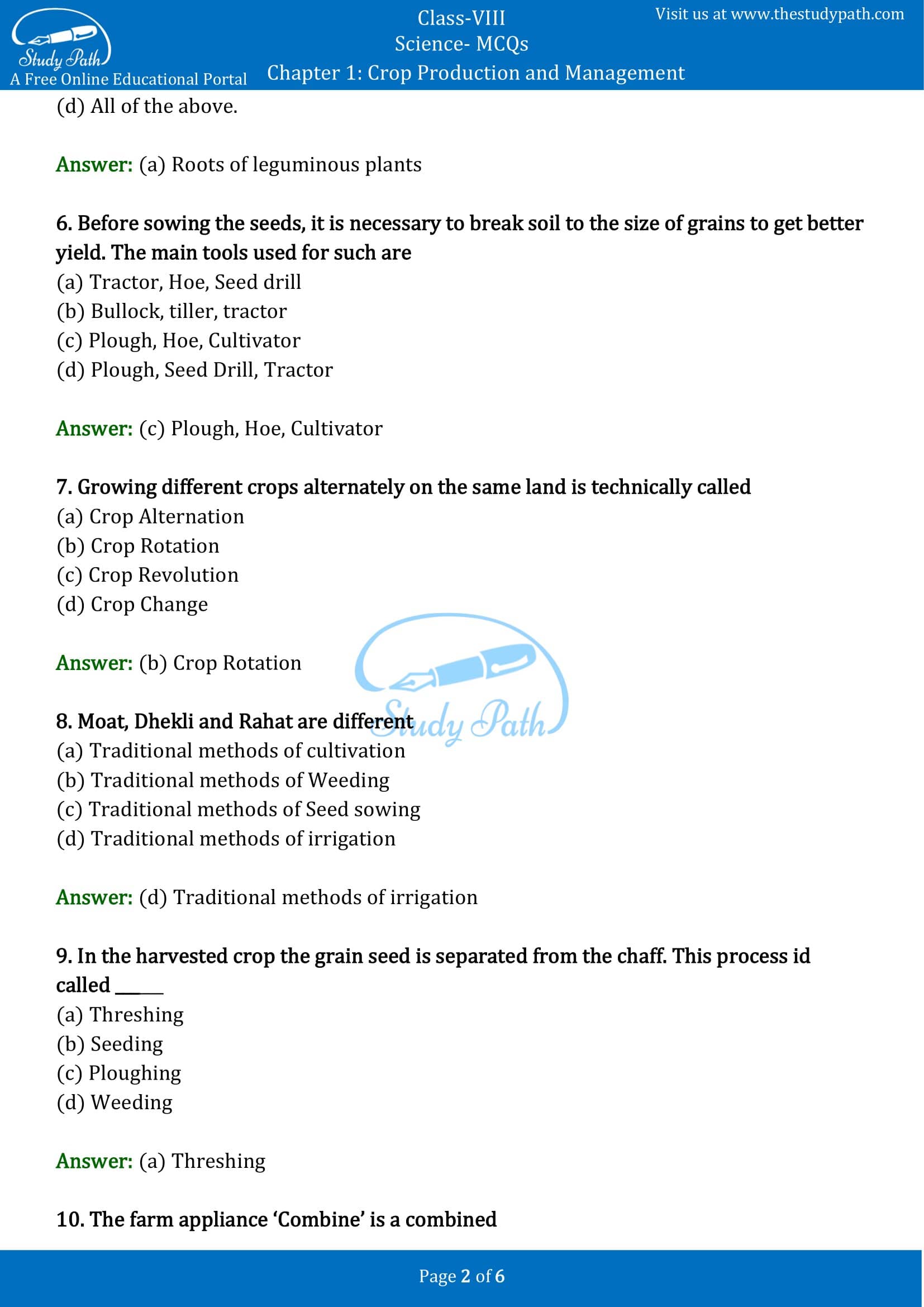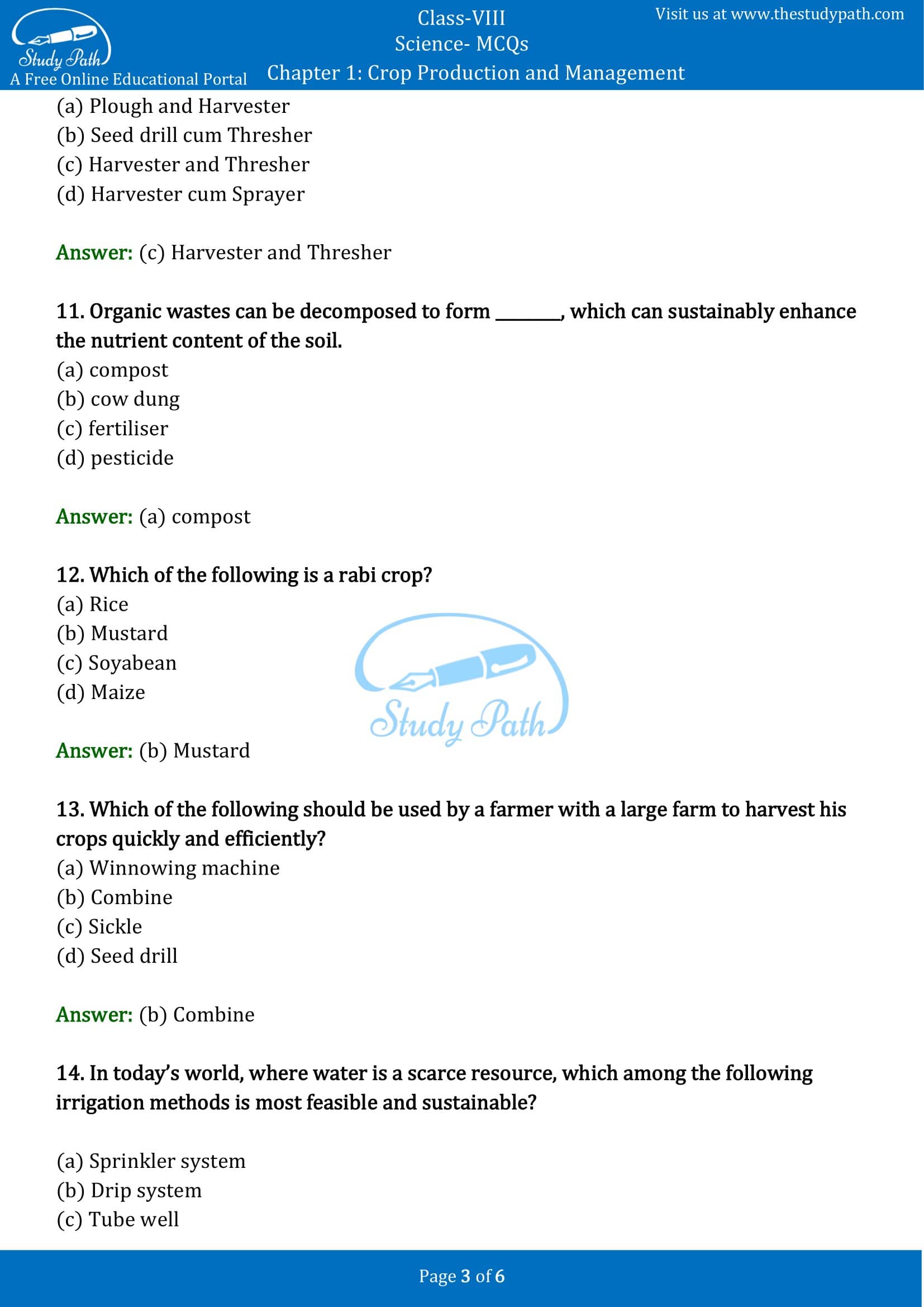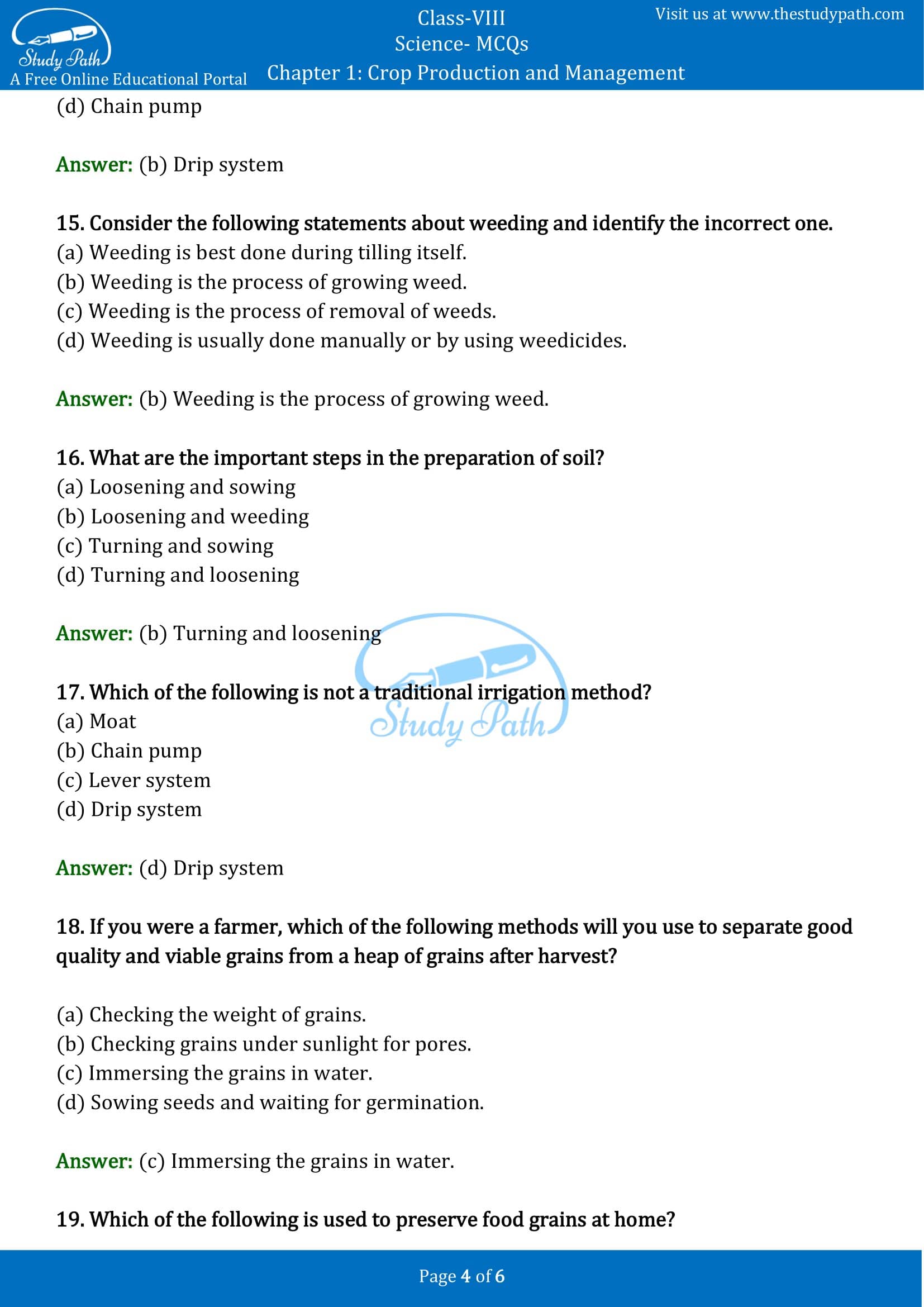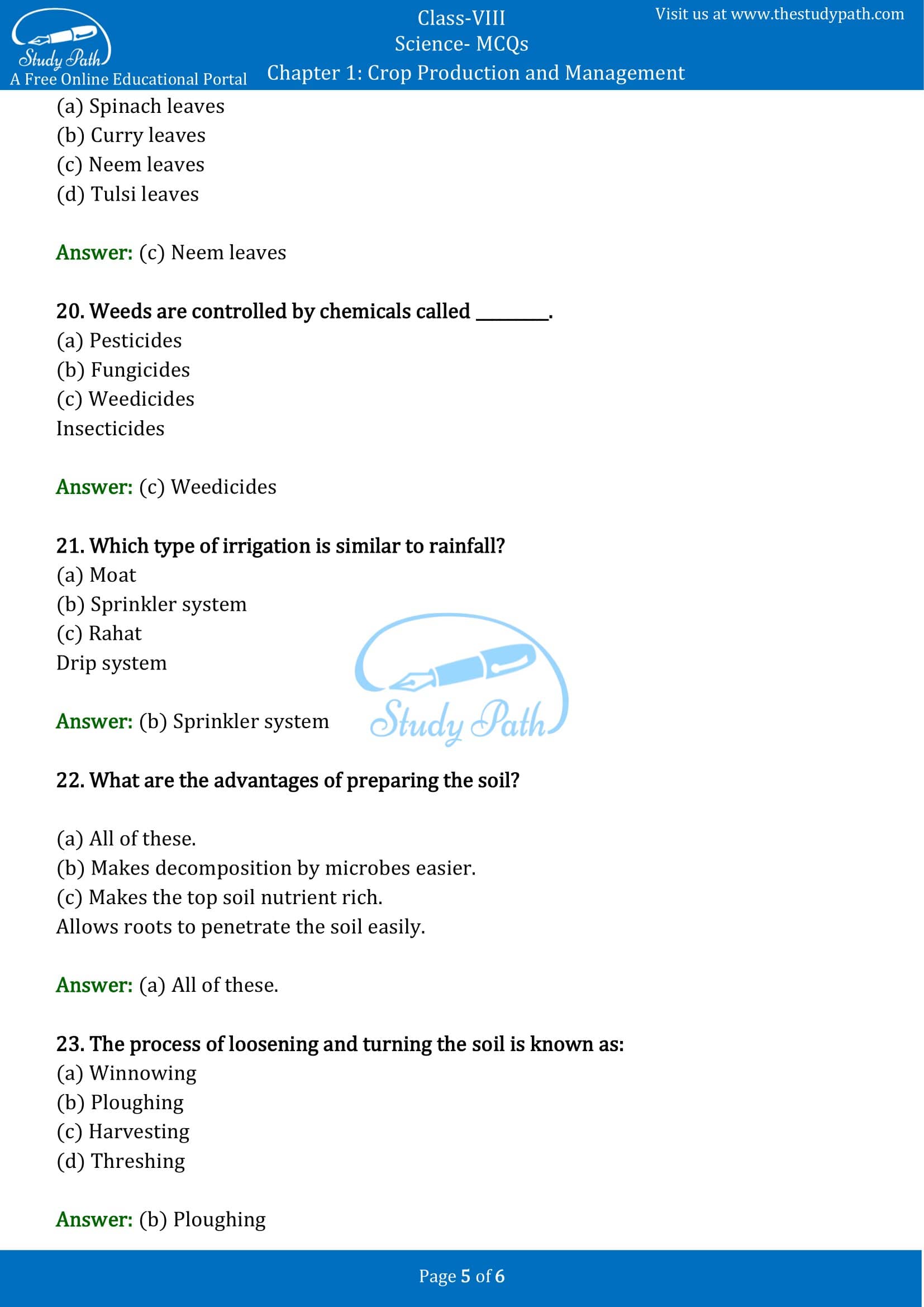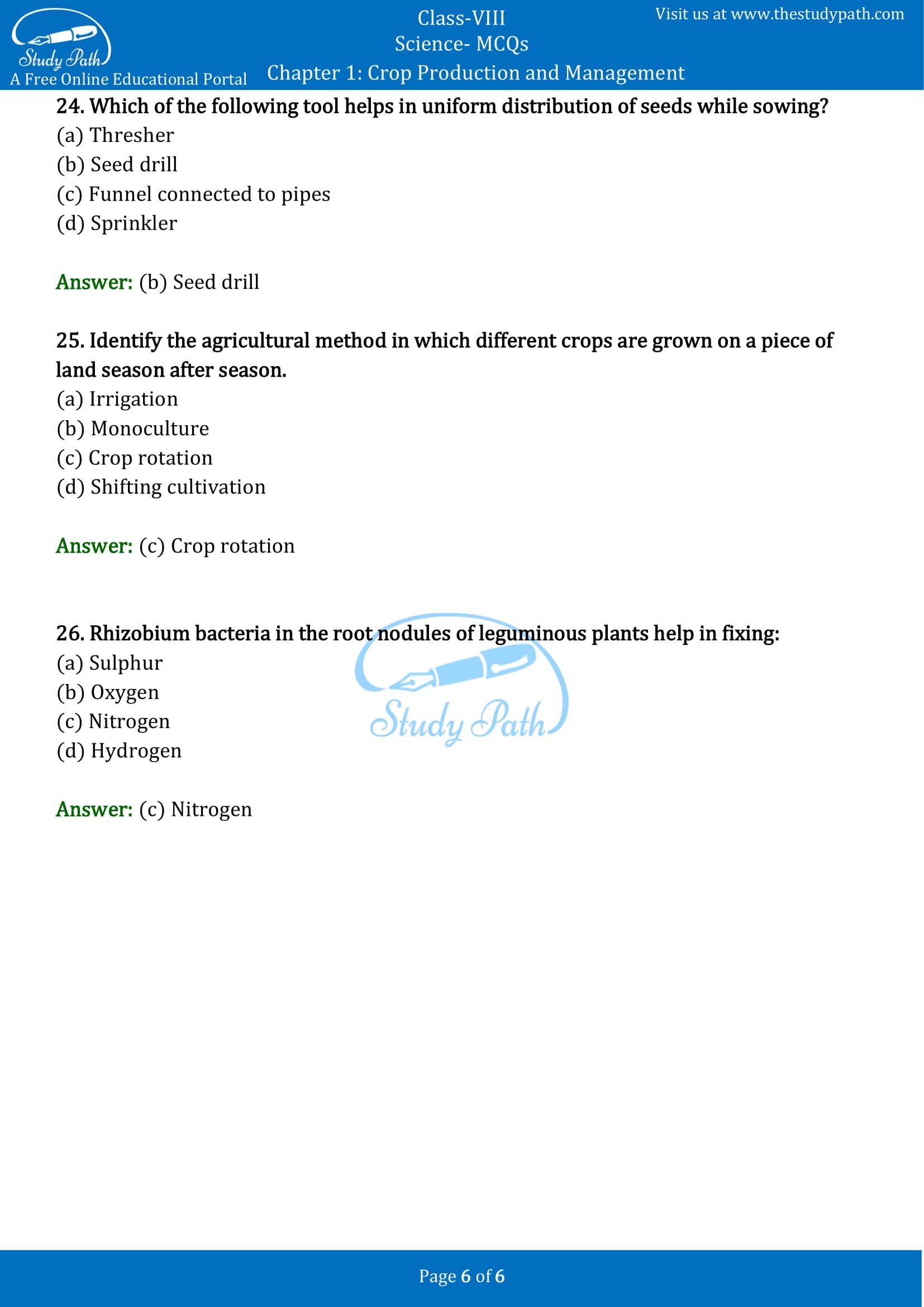Class 8 Science Chapter 1 Crop Production and Management MCQ with Answers
Class 8 Science Chapter 1 Crop Production and Management MCQ (Multiple Choice Questions) with Answers is available here in PDF format. CBSE Class 8 Science Chapter 1 Objective Questions helps the students to understand the concepts thoroughly and to score good marks. Practising these MCQs will help you to answer every question that is being asked in the exams.
At Study Path, you can download PDF of Multiple Choice Questions for Class 8 Chapter 1 with Answers Crop Production and Management. Science MCQs for Class 8 Chapter 1 with Answers is prepared on the basis latest exam Pattern. Students can solve NCERT Class 8 Science Crop Production and Management MCQs Pdf with Answers to know their preparation level.
Crop Production and Management Class 8 MCQ with Answers
Multiple Choice Questions (MCQs)
1. The Crops which are grown in rainy season are called
(a) Rabi crop
(b) Seasonal crop
(c) Monsoon crop
(d) Kharif crop
Answer: (d) Kharif crop
2. Rabi Crops are grown in _______ season
(a) Summer
(b) Spring
(c) Winter
(d) rainy
Answer: (c) Winter
3. Nowadays seed is sown in the field using
(a) Seed Tractor
(b) Seed drill
(c) Seed Tiller
(d) Seed Plough
Answer: (b) Seed drill
4. Which of the following description is true for describing ‘fertiliser’
(a) Used in large quantity
(b) Organic in nature
(c) Does not cause pollution
(d) Produced in factories
Answer: (d) Produced in factories
5. Rhizobium (a Bacteria) which fixes atmospheric nitrogen are found in nodules growing in
(a) Roots of leguminous plants
(b) Leaves of leguminous plants
(c) Stem of Leguminous plants
(d) All of the above.
Answer: (a) Roots of leguminous plants
6. Before sowing the seeds, it is necessary to break soil to the size of grains to get better yield. The main tools used for such are
(a) Tractor, Hoe, Seed drill
(b) Bullock, tiller, tractor
(c) Plough, Hoe, Cultivator
(d) Plough, Seed Drill, Tractor
Answer: (c) Plough, Hoe, Cultivator
7. Growing different crops alternately on the same land is technically called
(a) Crop Alternation
(b) Crop Rotation
(c) Crop Revolution
(d) Crop Change
Answer: (b) Crop Rotation
8. Moat, Dhekli and Rahat are different
(a) Traditional methods of cultivation
(b) Traditional methods of Weeding
(c) Traditional methods of Seed sowing
(d) Traditional methods of irrigation
Answer: (d) Traditional methods of irrigation
9. In the harvested crop the grain seed is separated from the chaff. This process id called ______
(a) Threshing
(b) Seeding
(c) Ploughing
(d) Weeding
Answer: (a) Threshing
10. The farm appliance ‘Combine’ is a combined
(a) Plough and Harvester
(b) Seed drill cum Thresher
(c) Harvester and Thresher
(d) Harvester cum Sprayer
Answer: (c) Harvester and Thresher
11. Organic wastes can be decomposed to form ________, which can sustainably enhance the nutrient content of the soil.
(a) compost
(b) cow dung
(c) fertiliser
(d) pesticide
Answer: (a) compost
12. Which of the following is a rabi crop?
(a) Rice
(b) Mustard
(c) Soyabean
(d) Maize
Answer: (b) Mustard
13. Which of the following should be used by a farmer with a large farm to harvest his crops quickly and efficiently?
(a) Winnowing machine
(b) Combine
(c) Sickle
(d) Seed drill
Answer: (b) Combine
14. In today’s world, where water is a scarce resource, which among the following irrigation methods is most feasible and sustainable?
(a) Sprinkler system
(b) Drip system
(c) Tube well
(d) Chain pump
Answer: (b) Drip system
15. Consider the following statements about weeding and identify the incorrect one.
(a) Weeding is best done during tilling itself.
(b) Weeding is the process of growing weed.
(c) Weeding is the process of removal of weeds.
(d) Weeding is usually done manually or by using weedicides.
Answer: (b) Weeding is the process of growing weed.
16. What are the important steps in the preparation of soil?
(a) Loosening and sowing
(b) Loosening and weeding
(c) Turning and sowing
(d) Turning and loosening
Answer: (b) Turning and loosening
17. Which of the following is not a traditional irrigation method?
(a) Moat
(b) Chain pump
(c) Lever system
(d) Drip system
Answer: (d) Drip system
18. If you were a farmer, which of the following methods will you use to separate good quality and viable grains from a heap of grains after harvest?
(a) Checking the weight of grains.
(b) Checking grains under sunlight for pores.
(c) Immersing the grains in water.
(d) Sowing seeds and waiting for germination.
Answer: (c) Immersing the grains in water.
19. Which of the following is used to preserve food grains at home?
(a) Spinach leaves
(b) Curry leaves
(c) Neem leaves
(d) Tulsi leaves
Answer: (c) Neem leaves
20. Weeds are controlled by chemicals called _________.
(a) Pesticides
(b) Fungicides
(c) Weedicides
(d) Insecticides
Answer: (c) Weedicides
21. Which type of irrigation is similar to rainfall?
(a) Moat
(b) Sprinkler system
(c) Rahat
(d) Drip system
Answer: (b) Sprinkler system
22. What are the advantages of preparing the soil?
(a) All of these.
(b) Makes decomposition by microbes easier.
(c) Makes the top soil nutrient rich.
Allows roots to penetrate the soil easily.
Answer: (a) All of these.
23. The process of loosening and turning the soil is known as:
(a) Winnowing
(b) Ploughing
(c) Harvesting
(d) Threshing
Answer: (b) Ploughing
24. Which of the following tool helps in uniform distribution of seeds while sowing?
(a) Thresher
(b) Seed drill
(c) Funnel connected to pipes
(d) Sprinkler
Answer: (b) Seed drill
25. Identify the agricultural method in which different crops are grown on a piece of land season after season.
(a) Irrigation
(b) Monoculture
(c) Crop rotation
(d) Shifting cultivation
Answer: (c) Crop rotation
26. Rhizobium bacteria in the root nodules of leguminous plants help in fixing:
(a) Sulphur
(b) Oxygen
(c) Nitrogen
(d) Hydrogen
Answer: (c) Nitrogen
At Study Path, you can also learn more about science chapter 1 crop production and management by accessing the free exhaustive list of study materials and resources related to the chapter such as NCERT Solutions, Important Questions and Extra Questions.
